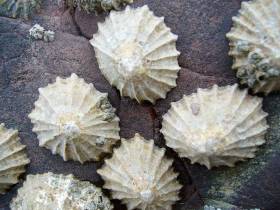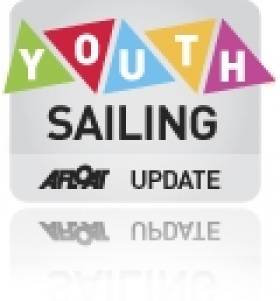Displaying items by tag: TCD
Global oceans could be in a more fragile state than previously apparent, new research published today suggests.
An international team involving Trinity College Dublin (TCD) has shown that current de-oxygenation levels are very similar to those that were implicated in one of the world’s largest ever mass extinctions.
The research published in international journal Nature Geosciences suggests that oceanic anoxia played an important role in ecosystem disruption and extinctions in marine environments during the Triassic–Jurassic mass extinction.
 Sampling of the Carnduff cores, which were drilled in the Larne Basin, Northern Ireland
Sampling of the Carnduff cores, which were drilled in the Larne Basin, Northern Ireland
This was a major extinction event that occurred around 200 million years ago, and one of a series linked to the collapse of global ecosystems and extinction of species.
The international research team led by scientists from Royal Holloway in Britain, and involving scientists from Trinity College Dublin’s School of Natural Sciences and the Netherlands Utrecht University was able to link two key aspects associated with the Triassic–Jurassic mass extinction.
The team used chemical data from ancient mudstone deposits obtained from drill-cores in Northern Ireland and Germany.
The scientists say they discovered that pulses in de-oxygenation in shallow marine environments along the margins of the European continent at that time “directly coincided” with increased extinction levels in those places.
 A core sample of ~201 million year old sediments obtained from the Carnduff-2 core, drilled in the Larne Basin (Northern Ireland), showing the shell of an animal that lived on the seabed shortly after the Triassic–Jurassic global mass extinction
A core sample of ~201 million year old sediments obtained from the Carnduff-2 core, drilled in the Larne Basin (Northern Ireland), showing the shell of an animal that lived on the seabed shortly after the Triassic–Jurassic global mass extinction
The team also found that the global extent of extreme deoxygenation was rather limited, and similar to the present day.
“Scientists have long suspected that ocean de-oxygenation plays an important role in the disturbance of marine ecosystems, which can lead to the extinction of species in marine environments,” Micha Ruhl, assistant professor in Trinity’s School of Natural Sciences and a member of the research team, has said.
“The study of past time intervals of extreme environmental change shows this to be the case, which teaches us important lessons about potential tipping points in local, as well as global ecosystems in response to climatic forcing,”Ruhl said.
“Crucially however, the current findings show that even when the global extent of de-oxygenation is similar to the present day, the local development of anoxic conditions and subsequent locally increased extinction rates can cascade in widespread or global ecosystem collapse and extinctions,”he warned.
He said this can happen “even in areas where de-oxygenation did not occur”.
“It shows that global marine ecosystems become vulnerable, even when only local environments along the edges of the continents are disturbed,”he said.
“Understanding such processes is of paramount importance for assessing present day ecosystem stability, and associated food supply,”he said.
He said this was especially so “in a world where marine deoxygenation is projected to significantly increase in response to global warming and increased nutrient run-off from continents”.
This research was supported by a Natural Environment Research Council Doctoral Training Partnership award and the National Natural Science Foundation of China.
Trinity Researchers Tag Basking Sharks in West Cork to Learn More About Ocean’s Second Largest Fish
Researchers from Trinity’s School of Natural Sciences were in West Cork earlier this month to tag some of the many basking sharks that have been frequenting our shores — and learn more about the second largest fish in the world’s oceans.
Funded by the Irish Research Council and Science Foundation Ireland, Assistant Professor Nicholas Payne and PhD candidate Haley Dolton spent a week on the water with West Cork Charters in which they managed to apply tags to four basking sharks.
These electronic tags will accumulate data about the sharks’ behaviour and physiology as they move around the coast feeding on plankton.
The goal, the researchers say, is to learn more about the anatomy and physiology of these gentle giants and hopefully guide conservation efforts for this endangered marine wildlife species.
“Basking sharks are a difficult species to study because they are not very abundant and they only grace our shores for a brief period each year, from April to August, so I am delighted we were able to learn so much about them this past week,” said Dr Payne.
Sadly the first phase of the pair’s work involved dissecting the remains of two basking sharks that washed up on the West Cork coast at the end of April, as previously reported on Afloat.ie.
“We would rather not have have had the opportunity to examine the two sharks that died prematurely before we took to the sea, but these sad events did at least help us learn more about them,” Dr Payne explained.
“Basking sharks are an endangered species and at risk of death from fishing bycatch and from getting struck by boats, so the more we know about them — especially their behaviour and physiology — the better chance we have of protecting them.
“The experience we had of observing live sharks in all their glory really emphasises that we should do our best to protect these incredible animals.”
Dolton added: “The amount of data we managed to collect throughout the whole week was phenomenal and beyond what I’d hoped for. We are currently analysing all the results and look forward to sharing our findings with everyone later in the year.”
‘Super Healing’ Limpets & Potentially Lifesaving Sea Sponges Among Recent Irish Marine Science Firsts
#MarineScience - Researchers at Trinity College Dublin have identified ‘super healing’ capabilities in limpets, as Trinity News reports.
The small molluscs, which can be found in coastal areas all around the world, were studied for a paper in the Journal of the Royal Society Interface.
Trinity scientists found that the limpets they studied were able to sense minor damage to their shells from weathering or predator attacks, and repair them much in the way mammals heal broken bones.
Meanwhile, sea sponges recently discovered in Ireland’s deep ocean territory could hold special medicinal properties, according to The Irish Times.
Samples taken during the recent Marine Institute expedition are being tested for their effectiveness in treating cancer, Parkinson’s disease, Huntington’s disease, epilepsy and other conditions.
The relevant chemicals are produced by the sponges as part of their defences against competing marine organisms, and NUI Galway’s Dr Louise Alcock hopes to see positive results within the next year.
Cork Institute of Technology Win 2010 Student Yachting Nationals
Last weekend saw the Student Yachting Nationals take place at the Royal Cork Yacht Club. The students had the use of the ISA J80 Sailfleet for the event. Six college teams entered for the Nationals which was the Qualifier for the Student Yachting World Cup 2011.
Racing was scheduled for Cuskinny on Friday and conditions were ideal with 17-20 knots of breeze. Race Officer, Nathan Kirwan, got in four good races lasting some 40 to 50 minutes each. However, spinnakers were banned as some wipeouts had been observed by the ISA Bosun who exercised his judgment in this regard. Some two minutes after the start of the first race UCC skippered by Robert O'Leary suffered a snapped halyard but were refused redress. CIT skippered by George Kenefick lost their only winch handle overboard some three minutes before the start in race 1 but still managed to win the race by a comfortable margin. In race 2 UCC came back strongly to take the gun and pushing CIT into second place. At this stage match racing had begun between the two Cork colleges with each throwing dummy tacks to try to clear their air. In Race 3 TCD skippered by Alistair Kissane took the win with CIT in second and UCC third. The final race of the day was won by CIT with UCC third. Overall standings for Day One were: CIT 6pts, with UCC and TCD on 12 pts each. UCD had got off to a shaky start which was to prove costly for them as they were on form on days two and three.
On day two the Race Officer moved the course to the Curlane Bank and spinnakers were permitted. CIT found their rythym taking the bullet in race 5 with UCD in second and a poor mark rounding relegated UCC to third place. Race 6 saw the O'Leary and Kenefick teams doing circles at the pre start as the competition was intensifying and it was looking like a two horse race. UCC took first place with NUIG taking second and CIT third. Donagh Good of CIT went for a quick dip in the cold water but managed to grab on and was pulled back on board by George Kenefick and Kevin Goulding. Later during day 2 the wind was rising to 22 knots so spinnakers were once again banned. UCC found the conditions very much to their liking, taking the win, with TCD in second, UCC third and CIT fourth. Race 8 proved to be rather interesting with CIT managing to relegate UCC to last position and managing to keep UCC in their sight for the duration of the race. Downwind was difficult for CIT with UCC right on their tail but UCC were not successful in finding a passing lane. Again, UCD took their second bullet of the day with CIT and UCC in fifth and sixth positions some four to five minutes behind the rest of the fleet. CIT were able to discard their fifth position but UCC were unlucky in having to count their sixth as they also had a sixth from day one. TCD again got a second position. Results after day two were: CIT 14pts, UCC 19pts, UCD and TCD on 21pts each.
Day 3 was a non discardable coastal race from Crosshaven to Kinsale counting for 1.5pts. The start line was just off Roches Point with five knots of breeze and brilliant sunshine. UCC led the fleet and NUIG and CIT were in last position 300 metres behind the rest of the fleet. As the race went on the wind increased to a nice south westerly breeze of 12 to 14 knots. As this stage it looked as if it might be UCC's lucky day but Team CIT maintained their composure and by tacking close to the shore and keeping out of the tide managed to finish in third position at the Bulman Buoy with UCC first and UCD second. This result was to prove sufficient to give CIT the national student title for 2010.
Overall Results:
CIT 18.5pts
UCC 20.5pts
UCD 24pts
TCD 28.4pts
NUIG 33pts
UL 40pts































































